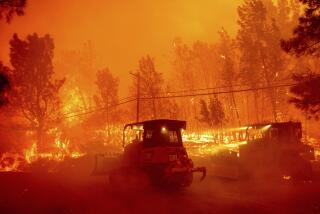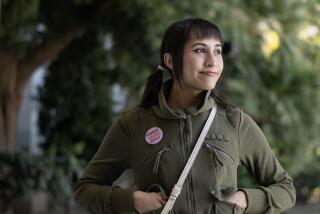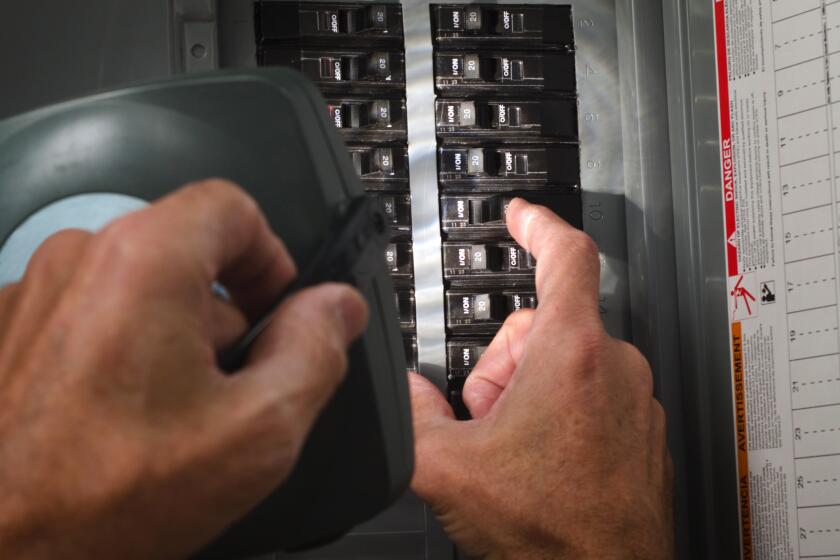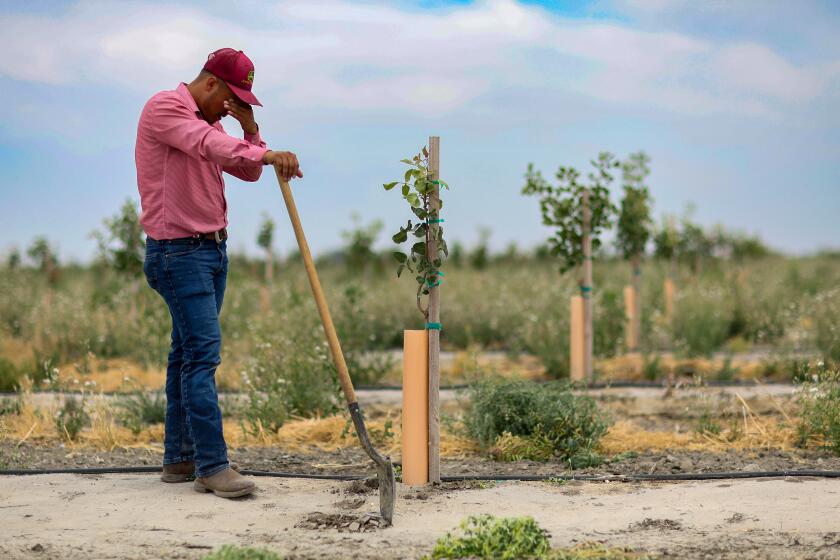Turning In Parents for Using Drugs: The Great Debate : Adults Have Doubts, but Many Youngsters Say Such Drastic Action May Be Needed
While adults are expressing concern over two Southern California cases in which children turned their parents in to authorities for alleged drug use, there apparently is widespread support among children and teen-agers themselves for taking drastic action when parents use drugs.
Many children in particular seem to see drug use by parents as a threat to their own safety and parents’ health. For at least some, turning in parents is an act of love and concern.
For instance, Isaac Gonzales, an 11-year-old sixth-grader at the Twenty Fourth Street Elementary school in central Los Angeles expressed what seems to be a widely held sentiment. When asked what he thought about Deanna Young, the Orange County girl who turned in her parents to police last month, Gonzales said, “I think it was good. She was doing something good for her parents . . . I think I would report them like the girl did (if he were in similar circumstances). I would do something good for them and something good for me.”
Creation of Generation Gap
Moreover, the drug abuse issue seems to be creating a generation gap in which children and teen-agers see themselves pitted against adults whose attitudes, they say, are often hypocritical. And many children and teen-agers are involved in drug use not because they were first exposed to drugs at school or on the street, but because they first experimented with their parents’ drugs.
Those are among the impressions that emerged in interviews with children, teen-agers and drug abuse experts as the country gears up for for a major escalation in the war on drugs. Drug availability outside the home, peer pressure and curiosity remain the most influential factors in drug use among young people, experts said. But just as the strong relationship between parent and child alcoholism has been known for many years, now the pattern of family drug abuse is moving on to illegal drugs, most notably cocaine and marijuana, they said.
For that and other reasons, many children and teen-agers apparently see the actions of Deanna and an unidentified 11-year-old who earlier this week reported her parents to Los Angeles police as defensible, at least in principle.
Adults, on the other hand, seem more inclined to be offended by the prospect of children informing on their parents. Local radio talk shows have been flooded with calls this week from adults who, typically, compare such behavior by children to the attitudes that nourished the Hitler Youth movement in the ‘30s.
A sampling of opinion among children and adolescents, however, brought a predominance of support for turning in parents who use drugs.
“I think it all had to do with her care about her parents,” said Kim Bush, a 16-year-old junior at Gahr High School in Cerritos. “They (parents) discipline the kids; the kids don’t discipline the parents. So there was really nothing else she could do. Even talking to them may not have had any effect on them. I think that she did the right thing.”
‘Turn Her In’
A dark-haired, leather-jacketed youth who identified himself only as Lee, said that he hadn’t heard of the Young incident until told of it by a reporter. But, he added, “Well, if I was her parents I’d be mad, but I think it’s basically the right idea because if my mom was using I’d probably just turn her in instead of talking to her about it (to) get the point across.”
At the Twenty Fourth Street Elementary School, James Blyden, an 11-year-old sixth-grader, commented, “I think she (Deanna) did a good thing because if she hadn’t turned her parents in they might have kept on doing it and died.”
One of the dissenters was Jenny Sears, a 17-year-old senior at Norwalk High School.
“I don’t approve of it,” Sears said. “I think she should have talked to her parents first. It was like she came home and said, ‘Oh wow, I’m going to turn in my parents today.’ And I think she could have at least told her parents, asked them why they were doing it or something, told them I’m going to turn you in if you don’t knock it off.”
However, if those efforts failed, Sears said, “Then, yeah, it would be all right to turn them in, but I think she should have given them some kind of warning.”
At the Twenty Fourth Street Elementary School, all of the children interviewed had participated in an anti-drug classes taught by Los Angeles Police Department officers. The Project DARE (Drug Abuse Resistance Education) program focuses on fifth-, sixth- and seventh-graders. The program includes 17 classes on topics such as “media influences on drug use,” “resisting gang pressures,” and “managing stress without taking drugs.”
The sixth-grader who earlier this week told police that her parents were growing and smoking marijuana is a student at another school and had taken DARE classes there.
However, DARE spokesman Sgt. Mike Schaffer said that students are told not to discuss family and friends during the classes and that officer-teachers are in the schools for education, not enforcement.
It is far from clear that every child who says he would turn in his parents would actually do so. At the Twenty Fourth Street School, one 11-year-old agreed that turning in parents seemed like a good idea. But the youngster confided, “My father, he just smokes marijuana.” He added that he wouldn’t turn in his father unless “he, like, starts getting dizzy and all that, then I’ll know he’s overdoing it . . . and turn him in.”
Magic Thinking
Sandy Silverstein, a Pacific Palisades psychotherapist who has also practiced in New York’s tough Bedford-Stuyvesant area, speculated that a child or teen-ager who says he or she would turn in his parents is resorting to “a magic kind of thinking,” meaning that children have not thought through the consequences of reporting parents to authorities.
(Deanna Young was placed in the custody of juvenile authorities after reporting her parents. However, she was returned to the permanent care of her parents earlier this week. The Los Angeles youngster who reported her parents’ alleged marijuana use also was taken from her parents even though no arrests were made.)
On the other hand, said psychotherapist Thom Waner, widely publicized issues such as child abuse have made children aware that “feeling blind loyalty just because they’re your parents” is no longer the only acceptable attitude.
During interviews, drug abuse experts, children and teen-agers said again and again that parental and adult hypocrisy about drug use often contributes to drug abuse or to attitudes about drugs. One child development specialist phrased it this way: “Adults say our drugs are good but your drugs are bad.”
Therefore, there is much skepticism about adult lectures on drugs and many children and teen-agers apparently choose not to listen to their elders. For instance, when President and Nancy Reagan deliver their joint national television address on drug abuse Sunday, there’s one blond, chain-smoking 15-year-old from Norwalk who won’t be tuning in.
Missie Hammontree said there’s one group she doesn’t want any preaching from--adults, including the President and First Lady.
She said she wouldn’t watch, eliciting nods and exclamations of agreement from a small group of friends and peers who had gathered to talk to a reporter about drug abuse.
Suspicious of Adults
Like many in her age group, Missie is suspicious of grown-ups, especially when they lecture about drug abuse. For Missie adults are part of the problem.
“One of my friends, her mom and dad are dealers, you know, pretty big dealers and everything and that’s how my friend got her drugs and everything, you know, and now she’s almost 20 years old and she still does drugs,” Missie said. “She’s been doing it since she was 9 years old. And her parents have been picked up, put in jail. They’re in the process of going to court right now. But what happened is her parents influenced her. They didn’t care if she was doing drugs or not.”
Missie’s anecdote is not an isolated example.
Los Angeles psychologist Robert Butterworth recalled having “one patient whose father was dealing cocaine and he wanted his kid off cocaine because he was stealing from his stash.”
Using at Home
Three or four years ago, Dr. David Lewis, medical director of the ASAP (Adolescent Substance Abuse Program) family treatment centers in Los Angeles and Ventura counties, said he would have been shocked to see an adolescent patient who had begun using drugs at home.
“It used to be that that was an absolute abnormality to see that happen,” Lewis said. “More and more we see kids stealing their parents’ stash. . . . Now if I see it, I say I’m not surprised.”
Currently, Lewis said, he is seeing about one case per week in which children used their parents’ drug supply for the first experiment with drugs. Three or four times a year, Lewis said, he has cases in which “the kid was in treatment and one of the two parents ended up in treatment.”
And pyschotherapist Waner, who estimated that half of the 30 patients he sees each week are drug abusers, said, “A lot of kids rip off their parents pot, their pills and their booze. Now it’s even gotten into cocaine.”
Waner, who also is head of the Los Angeles area National Assn. of Social Workers telephone referral service, said one of his patients addicted to alcohol and cocaine was conditioned by his mother from an early age to “handle his feelings by ingesting substances orally.” Waner believes the 21-year-old’s addictions began with a parental philosophy he summed up as “take a pill, eat a candy bar, take a drink . . . and you’ll feel better.”
While most instances of drug abuse beginning at home apparently involve children and adolescents covertly using parents’ drugs, that isn’t always the case.
Martin Cisneros, substance abuse counselor at the Rancho San Antonio boys home in Chatsworth, said he has been involved in cases in which “the parents will smoke (marijuana) or drink with the kid to form a friendship at the expense of being a parent.” Sometimes parents will tell their children, “If you’re going to smoke (marijuana), smoke in the home . . . Don’t do it like the old man and wander around on the street.”
Furthermore, the attitude of Missie, who believes the most effective drug treatment programs for teen-agers would involve only other teen-agers, is indicative of a generation gap in the war on drugs.
Sears said, “I think also people just say kids do drugs. They don’t realize adults do drugs. A lot of the blame is put on kids. You never hear about people going out and preaching against drugs for adults and the kids think, ‘Why pick on us?’ ”
Even though she said she doesn’t use drugs, 16-year-old Cathon Bush, Kim’s stepsister, agreed with Missie that high-ranking adults don’t pull much weight with her.
“Nancy Reagan is sitting in the White House, and what does she know about peer pressure and people trying to give you drugs and people dying off of drugs?” she said. “Everyone over there is waiting on her hand and foot and she’s saying don’t take drugs. . . She’s like, ‘I’m too perfect to take drugs.’ ”
Involves Whole Family
Despite the apparently widespread distrust of adults, drug treatment experts said that effective drug rehabilitation must involve the entire family, not just the family member perceived as the drug abuser.
” . . . it’s impossible to get a kid off drugs unless the parents stop,” psychologist Butterworth said. “If the parents don’t stop, forget it, you’re wasting your time. By drugs, I mean alcohol and everything else.”
And yet, despite the apparent generation gap between adults and children and teen-agers, “kids are starving for some sort of wholesome, loving family orientation,” particularly those from broken homes, Waner said.
Waner’s contention got support from Missie Hammontree. Her favorite television program is “The Cosby Show,” the No. 1-rated series about a black doctor and his family.
“They show the perfect family; they joke around together, they understand each other and I’ve never seen them punish their kids,” she said. “You make one mistake in the real world and you get it, but on there they don’t. It’s weird.”
More to Read
Sign up for Essential California
The most important California stories and recommendations in your inbox every morning.
You may occasionally receive promotional content from the Los Angeles Times.






